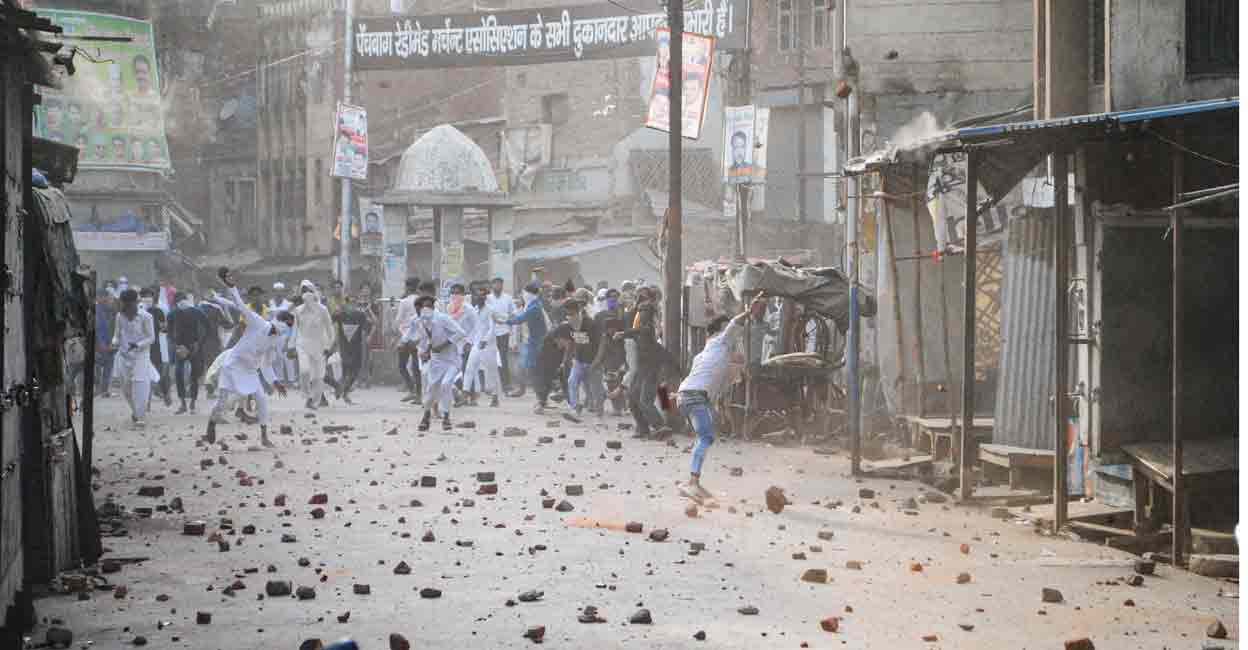Explained | How will Prophet Muhammad controversy affect India's diplomatic ties, trade

Mail This Article
From the national language debate to offensive statements against minority religions, the Bharatiya Janata Party has been courting one controversy after the other for the past few months. The Indian government has found itself caught in a diplomatic crisis this week with its right-wing politics.
So what led to the widespread condemnation of the republic ahead of its 75th Independence Day.
On May 28, BJP spokesperson Nupur Sharma made some controversial comments about the Prophet and the Quran during a television debate. And on June 1, another BJP leader Naveen Jindal posted offensive content about Islam on Twitter.
The BJP subsequently distanced itself from the two leaders and suspended Nupur, and expelled Naveen to appease various interest groups. A case was registered against Nupur Sharma for the highly objectionable remarks.
The duo issued an apology soon after the party's action against them. Nupur Sharma unconditionally withdrew the controversial statement and claimed that her comments were a reaction to "continuous insult and disrespect towards Lord Shiva and that could not be tolerated."

Communal tension in Kanpur
Though insensitive comments by members of the right-wing party are nothing new, the extremely controversial nature of the remarks this time quickly sparked communal tensions.
Violence erupted in parts of Kanpur after Friday prayers as members of two communities threw bricks and improvised bombs trying to shut down shops there. At least 40 people, including 20 police personnel, were injured during the clashes and 18 were arrested.

Furious trade allies in Middle-East
Communal tensions aside, India's essential trade allies from the Far West to the Middle East were furious. This quickly prompted the BJP to defuse tension with a statement.
On June 5, without directly referring to the issue, party general secretary Arun Singh said in a statement that the BJP is firmly against any ideology which insults or demeans any sect or religion.
"During the thousands of years of history of India, every religion has blossomed and flourished. The Bharatiya Janata Party respects all faiths. India's Constitution gives the right to every citizen to practise any religion of their choice and to honour and respect every religion," he said.
Qatar, Iran and Kuwait summoned India's ambassadors on June 5 and they expressed their strong protest and condemnation of the controversial remarks against the Prophet. Saudi Arabia, Bahrain and Afghanistan also joined the others the next day in condemning the controversial remarks and called for "respect for beliefs and religions".
Spokespersons of the Indian embassy conveyed that the tweets do not, in any manner, reflect the views of the Government of India.
India's not-so-friendly neighbour Pakistan was also quick to lash out against the country.
Pakistan Prime Minister Shehbaz Sharif tweeted, "Have said it repeatedly. India under Modi is trampling religious freedoms & persecuting Muslims. The world should take note & severely reprimand India. Our love for the Holy Prophet (PBUH) is supreme. All Muslims can sacrifice their life for the Love & Respect of their Holy Prophet (PBUH)."
India was quick to slam Pakistan's statement saying 'a serial violator of minority rights commenting on the treatment of minorities in another nation' is absurd.
Call for boycott of Indian products
The controversial remarks also sparked a Twitter trend in the Arab world calling for a boycott of Indian products.
Qatar Foreign Ministry, in its statement, said that allowing such Islamophobic remarks to continue without punishment constitutes a grave danger to the protection of human rights. The country also called on the Indian government to distance itself from the issue.
Being a party which thrives from the support of the majority, the BJP seldom fears the backlash of minorities against their policies or propaganda.
However, this time the repercussions are unlikely to stay in muted tones. An economic sanction or boycott from its significant trade partners could adversely affect the country already struggling to keep its finances intact.
Muslims make up around 13 per cent of India's 1.35 billion people. The US State Department, in its annual report to the Congress on international religious freedom released in June, alleged that attacks on members of minority communities, including killings, assaults, and intimidation, took place in India throughout 2021.
Dismissing the report or walking the other way will do little to help India's diplomatic ties.
India's trade with the Gulf Cooperation Council (GCC), including Kuwait, Qatar, Saudi Arabia, Bahrain, Oman and the UAE, stood around $90 billion in 2020-21.
India's exports to the GCC have increased by 58.26 per cent to about $44 billion in 2021-22 against $27.8 billion in 2020-21, according to data of the commerce ministry.
The share of these six countries in India's total exports has risen to 10.4 per cent in 2021-22 from 9.51 per cent in 2020-21.

imports rose by 85.8 per cent to $110.73 billion compared to $59.6 billion in 2020-21, the data showed.
The share of GCC members in India's total imports rose to 18 per cent in 2021-22 from 15.5 per cent in 2020-21.
The top five product categories which were imported goods included petroleum products, premium metals, imitation jewellery, fertilisers, chemicals and plastics.
The UAE was the third-largest trading partner of India in 2021-22.
In addition, millions of Indians live and work in GCC countries.
Bilateral ties at stake
Let's put this in perspective. It is important to ensure that India does not allow matters to escalate to the level of the 2005 ban on Danish products by Islamic countries.
The Danish caricatures on Prophet Muhammad in 2005 had led to the boycott of Danish products by Muslim countries, costing firms millions. Between February and June 2006, Danish exports to Middle East fell by half and the cost to Danish firms was around 170 million dollars.
Important suppliers of fuel
In addition, the fuel shortage following the Russia-Ukraine crisis could worsen if the GCC countries and Iran decide to penalise India for its right-wing politics.
India, which depends on imports for 84 per cent of its crude oil needs, gets more than half of its imports from the Middle East.
So, if not for upholding the principles underlined in the Constitution, India would do well in practising religious tolerance, at least for the sake of economics.


